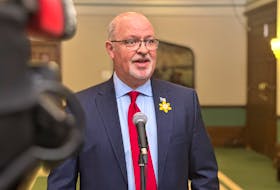If birth rates, deaths, and out-migration trends continue, a recent Memorial University-Harris Centre report on declining population projects a 40-per cent decline in communities from River of Ponds to St. Anthony.
While the report came as no shock, Bird Cove Mayor Andre Myers say it certainly presents alarming figures.
“Anyone in the region involved with economic development and the municipalities has been aware of the population issue for many years,” Myers said. “As mayor of Bird Cove, I see it all the time.”
The Town of Bird Cove saw a spike in population from 152 to 187 in the 2011 census, due to young families establishing in the community. Its population currently stands at 185.
“It’s what we want to see gained in the region overall,” said Myers. “One of my major focuses is ensuring we have the infrastructure to keep these families happy and living here.”
As a former deputy mayor and current mayor, Myers helped bring a playground and outdoor fitness park to the town. As well, Bird Cove has utilized programming related to disability, senior care and other special services.
“When people feel that the community is active and they can see things moving forward, they’ll be more inclined to stay,” he said. “But we have a long stretch to go – in the end, what we need for young families is jobs.”
Although many young families have settled in Bird Cove, yers says lack of local jobs has kept many people working away in provinces like Alberta and Ontario.
Flower’s Cove mayor Keith Billard is hoping to encourage population growth in his community by tackling what he feels is a main obstacle preventing it – Crown land.
“The Crown land should get out of business, and any Crown land within a municipality should be given to it so the council can attract business,” Billard said.
He has spent the past two years getting two pieces of unused Crown land overturned for new businesses for Flower’s Cove. One is for tourist cottages, and the other for a mechanic’s garage.
He says the projects took so long to get settled due to applying to the provincial government for appeals to reduce the price of the Crown land.
“We can do these things in months, but with Crown land it will take years,” he said. “It’s a thorn in our backs.”
Flower’s Cove is also in the midst of developing a new subdivision.
One major encouragement from the release of the Harris Centre report is an increased call for regional governance. Myers says this is something many communities of the Northern Peninsula have spent years calling for.
“Government’s decision under the Harper era to take out regional economic development boards was poor,” Myers said. “They did a lot of the ground work that pushed economic development forward in the region – now that funding has been taken away, there’s a gap.”
Myers believes regional development boards or regional governance must be instated. If not, rural Newfoundland and Labrador will continue to dry up.
“Something has to be brought in, and I’d like to see it roll out sooner rather than later,” he said. “It’s the only way we’re going to see any chance of survival.”
Billard agrees regional governance is the way forward for municipalities in his area. Although, due to some communities that will be hesitant because of current benefits like free paving and snow removal, he says it needs to be enforced by the provincial government.
“We’ve got 13 communities here from Anchor Point to Eddie’s Cove East,” said Billard. “If we had one regional government, and a provincial government that could push that as a priority, then we could get a lot of work done.”
For mayors like Myers and Billard, who have continuously devoted themselves to providing for their communities, the implications of a declining population are something they have been facing first hand for years.
They now hope above all that the Memorial University-Harris Centre report can encourage more direct action to ensure a strong future for the Northern Peninsula.
“I know how important it is, and we’re not pushing things forward fast enough,” Myers said. “There’s so many action items on the table, but there’s a lack of action in a lot of them.
“The information from the Harris Centre report is not new, but it might reignite some passion to people in our communities to tackle this.”









